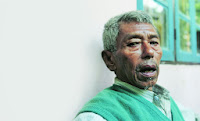[MLE] Education activists raise voice in Odisha

Dear Multilingual Education friends, It is once again that Odisha is in the news with regards to the need to use the mother tongue of the children in the school. This time the initiative to raise a voice was taken by Save the Children (Good to see you name among the speakers, Sanjeev!) and Sikshasandhan. In the context of RTE a state level consultation on Language, Tribal Education and Right to Education was held in Bhubaneswar last month. A few quotes from the Odishadiary website: A serious attempt should be initiated to explore the existing gaps to address the problems faced by the linguistic minority children, concerted advocacy efforts should be made by civil society groups, education activists and the government for the necessity of having a state level multilingual education policy (Dr Sanjeev Rai) Government has taken some initiatives in this regard meanwhile, but it needs to be expedited



